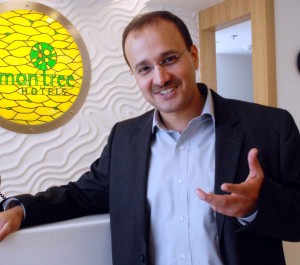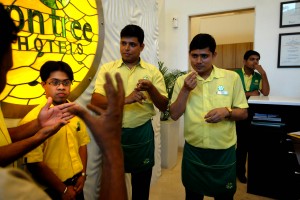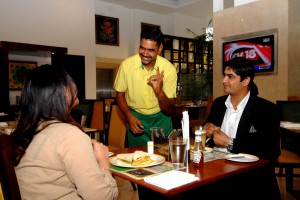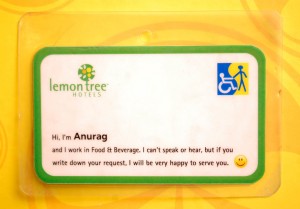
28 Jan, 2013
The Indian Hotel Group Where GMs “Speak” Sign Language
When Rahul Pandit, President and Executive Director of Lemon Tree Hotels, spoke at a panel discussion organised alongside the South Asia Travel & Tourism Exhibition (SATTE) in New Delhi on January 16, the theme topic was how to forge “mutually beneficial partnerships” in the industry. However, he had a different take on the term.“We Indians are rooted in our spirituality,” he said. “When we go to meet our maker, He is not going to ask whether we met our financial targets or delivered shareholder value. He is going to ask you how much good we did for humanity.”
The result is a “mutually beneficial partnership” between Lemon Tree Hotels and people with disabilities, of whom there is no shortage in India.

Rahul Pandit, President and Executive Director, Lemon Tree Hotels Ltd
In his presentation, Mr. Pandit said that with India facing a war for talent in the rapidly growing travel & tourism industry, it was decided to give people with disabilities a chance. Although this made business sense, it also was the right way to demonstrate social and moral responsibility.
“That becomes the driver of what we are trying to do, and what each of us can do,” Mr. Pandit said. He narrated the hiring process, the learning curves that were navigated and the stage it has reached. Today, 113 employees with disabilities work in various positions, from telephone operators to restaurant waiters across the group’s 20 hotels nationwide. About 100 are men and 13 women, with an average age of 28. Most come from lower middle class families, with just a basic education although a few have completed higher education. Their service level is as good as other staff, they get paid the same and their turnover is in the single digits, Mr. Pandit said.
“When we started integrating the employees with disabilities (EwDs), we discovered that those who are actually disabled are us. It is we who had to learn to better communicate with them. So our people started learning sign language. The general managers at some of our hotels can now ‘speak’ sign language. Staff learn how to say good morning and thank you in sign language. Certainly, it’s good for business but it’s also good for all the staff who enjoy doing a wider good as well as for the employees with disabilities who get a sense of achievement. Now, sign language has become so popular that it is being suggested that we should conduct our meetings in sign language. If anything, they would be far more effective and shorter.”
After the session, Travel Impact Newswire Executive Editor Imtiaz Muqbil asked Mr. Pandit to send through additional information on this unique “mutually beneficial partnership.” This is what he sent.
By Rahul Pandit, President and Executive Director, Lemon Tree Hotels, India
Social relevance and commitment to a cause may have become popular corporate pursuits lately, but before there was corporate social responsibility there was a sense of the right and fair to help and assist those with limitations to achieve their full potential.

Employees with disabilities at Lemon Tree Premier- Gurgaon
At Lemon Tree Hotels, this belief has seamlessly become a part of our corporate culture. When we began hiring Employees With Disabilities (EWDs) who are hearing and speech impaired, we did not see it as merely a CSR initiative but as a human response to the issue. Our effort has found very positive resonance across our organisation and today we are shaping our HR policies, our work space rules, even our architecture and access design around this theme.
Needless to say, such an initiative brings its own share of challenges and requires all round commitment and sensitisation across management and staff. Having pioneered this initiative in 2007, we have been able to implement a comprehensive program across India that is functioning reasonably well and today we have successfully conducted sensitivity training for all employees, including subsequent new hires. This was led by an external expert whose forte is Indian Sign Language and who has worked closely with hearing-and-speech impaired people. This creates immediate acceptability for new EWDs and a welcoming environment from day one. This has since become an integral part of our system.

Anurag, an EwD waiter at Gurgaon’s Lemon Tree Premier Hotel
There has also been a shift in emphasis since we began this programme. In the beginning we focussed on inducting EWDs in back-end roles like Kitchen Stewarding and Housekeeping, where direct guest interaction was minimal. This gave us an opportunity to develop standard operating procedures and training modules in an iterative manner. Subsequently, we extended this initiative to guest contact areas such as our restaurants, where interaction with guests is an integral part of the job role. We then re-engineered the relevant service process to enable EWDs to interact smoothly with guests. This re-engineering required innovative ideas like:
- EWD cards, which is a simple card introducing the employee and how best he/she can serve the guest which helps in setting expectations and sensitizing the guest.
- Numbered menu items which simplified the most difficult part of the process and made it easy for a guest to place an order.
These processes helped make the engagement a very positive one, for both the guest and the EWD. We have also brought in a few workplace policies that are part of this initiative.
- Whistles: We have provided whistles to all EWDs that can be used at the time of an emergency (fire, etc.) to attract attention and get help.
- External sign language expert: Though all employees are competent in Indian Sign Language, we engage an expert to help us with one-on-one chats or exit interviews with EWDs, so that we are able to give them a fair hearing.
- Distance from residence: We try to recruit EWD’s who live close to our hotels since commuting far distances can vastly increase their discomfort.

Card issued to EwDs at Gurgaon’s Lemon Tree Premier Hotel.
EWDs are vulnerable to being left behind over time due to inherent limitations. To ensure that their skill and knowledge levels stay up to standard requires substantial investments in training and constant refresher modules. The training formats need to be customised to their needs and the course material, as well as the delivery systems need to be in tune with the specific requirements of such employees. We have found the differently-abled to be diligent learners and as, if not more, competent as others provided they are trained appropriately.
We also follow a proactive hiring practice that aims at what we call optimal placement – where we try giving differently-abled employees roles or placing them in positions where they are not at a disadvantage (for instance in workplaces where there is significant noise, it can actually be an advantage). They can then be employed routinely and on an equal footing with other people rather than as a CSR or charitable initiative.
While we have robust policies in place for employing the differently-abled at Lemon Tree Hotels, we are also equally concerned about guests who are differently-abled and who we believe should have easy access to all areas of our hotels. That has required a paradigm shift in the way we look at hotel design, architecture, facilitation and sensitization of staff.
Our company philosophy is to make Lemon Tree Hotels an inclusive environment for employees and guests and to build processes with appropriate learning that will facilitate this objective. We currently have over 100 Employees with Disabilities (EWDs) in our team, who are all hearing-and-speech impaired. They work across different areas of our hotels e.g. Housekeeping, Kitchen Stewarding and Food & Beverage service. This is currently 5% of the total staffing of the 18 hotels we own/operate across India. Our goal is to take this to 10% of total staffing in 2013 or about 250 EWDs.
These efforts have lead to several awards and recognition for the LTH chain. Most prominently awards this year include:
- Ministry of Social Justice and Empowerment, Government of India National Award: Outstanding Work in the Creation of a Barrier-free Environment for Persons with Disabilities, 2012; Best Employer 2011
- NCPEDP (National Center for Promotion of Employment for Disabled People)-Shell Helen Keller Award 2012: Category C: Role Model Organizations, for the work towards promoting employment opportunities for people with disabilities
- NCPEDP-Shell Helen Keller Award 2012: Category B: Role Model Non-Disabled Individuals, for your work towards promoting employment opportunities for people with disabilities
- Svayam Accessibility and Universal Design Award, 2012
Additionally,
- Ranked in the Top 50 large organizations (>1000 employees) in the 2012 study of Best Companies to Work For by the Great Place to Work Institute & the Economic Times
- 15 hotels across the three brands were awarded TripAdvisor’s Certificate of Excellence 2012
- Outlook Traveller Award 2012 for Best Mid-range Hotel in India
See also:
https://www.travel-impact-newswire.com/2011/06/the-thrill-of-learning-a-new-language-sign-language/



Liked this article? Share it!